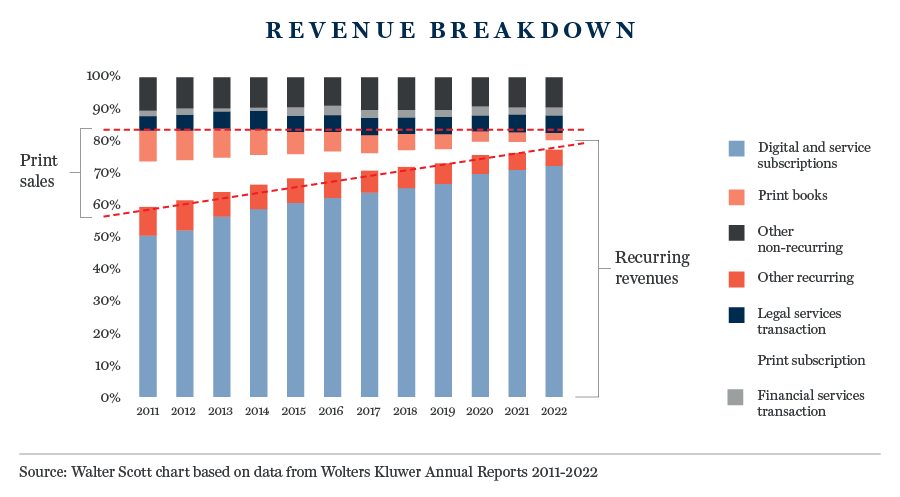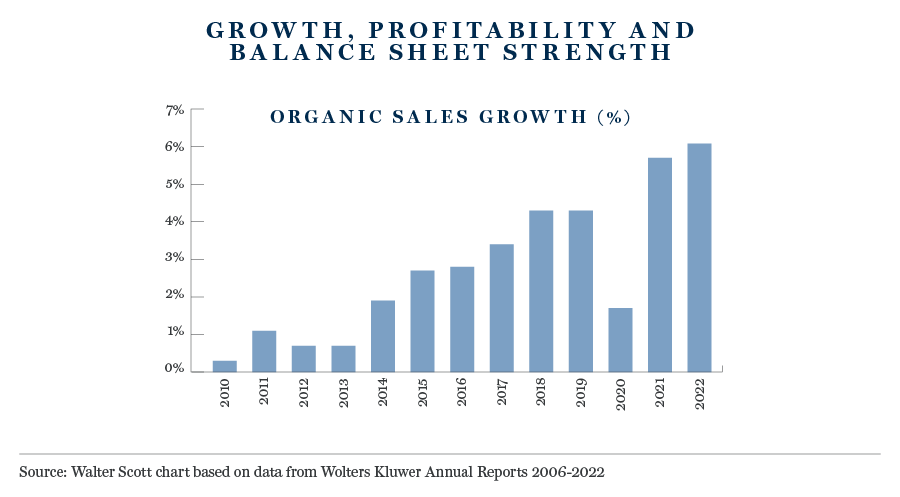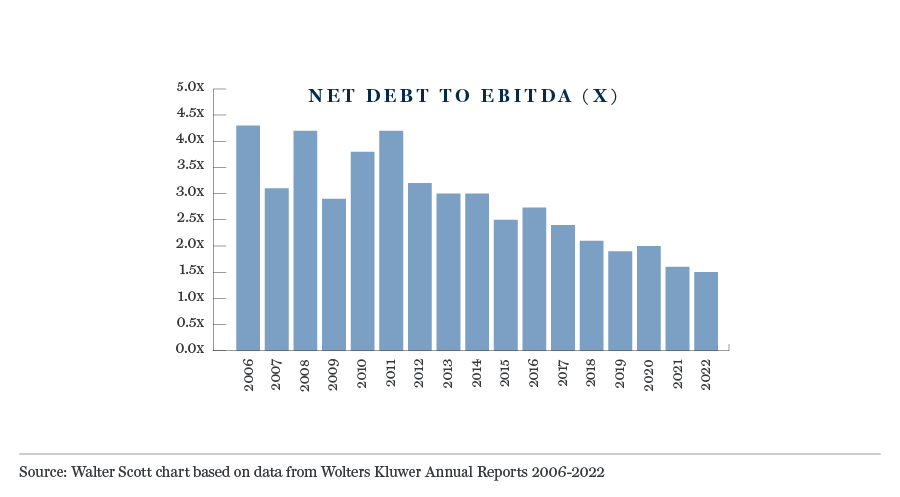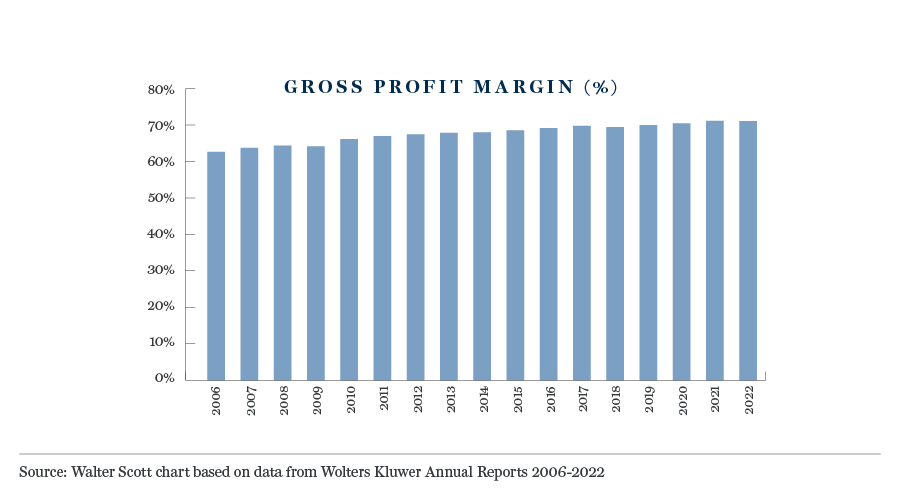If we were to need a reminder that disrupters come in all ages, Dutch company Wolters Kluwer founded in 1836 is just that.
All too often, excessive attention and excitement is centred on the latest ‘new’ disrupter. Often ignored is the fact that disruption isn’t only the preserve of the young. Almost by definition, companies with long and successful track records will have adapted to change, pivoted strategically and utilised disruptive ideas.
Wolters Kluwer has witnessed profound change in its marketplace of professional information, software and services but has adapted, disrupted and maintained its place as a reliable, authoritative and trusted provider of valued, and valuable, information.
Since 1836
Wolters Kluwer can trace its roots to four family-run publishing houses founded in the Netherlands between 1836 and 1918. The transformation of the Dutch economy and the associated constitutional and legal reforms had created a new demand for educational and informational literature, demand that these entrepreneurial businesses all successfully seized upon before merging together over later years.
Wolters Kluwer provides vital information, workflow tools and software that helps qualified professionals in white collar industries make critical decisions. These solutions combine deep domain knowledge with specialised technology
Walter Scott Research Note
For much of its history, Wolters Kluwer grew by building on its leadership in professional literature and printed resources for accountants, medical professionals and lawyers. In the 1990s it made several acquisitions in the US that expanded its position across those key markets. But the advent of the internet, of course, dramatically changed the publishing landscape and over time Wolters Kluwer successfully pivoted its business into digital publishing and online content. It also successfully developed a software and services offering to accompany its content, and further cement, and broaden, trusted relationships with its client base. Of course, that was not an overnight change and the print legacy business did weigh on returns for some time. However, by 2010 over 70% of revenues were from digital and software offerings.

Today, the company’s focus on a small number of professional markets remains unchanged but print sales represent only 6% of revenues, with Expert Solutions, its core recurring software offerings, accounting for 58% of sales, and delivering 7% organic growth in the most recent half-year results released in August 2023.
Transition from print-to-digital-to-solutions
The company’s strategic transition has also changed its financial profile. As lower-margin and low-growth print sales have reduced over time and debt has been reduced, more recent financial results have shown a consistently higher growth rate alongside higher margins. As the company continues its expansion from ‘old fashioned’ publishing into the faster growing areas of data and workflow solutions so profitability and returns are expected to move higher as this transition plays out.
That is not to suggest the company views this transition as an end goal, and whilst capex has now normalised the company continues to devote around ten percent of sales to investment in technological development, a commitment that has remained consistent over time. Across a number of centres around the world, the company’s in-house experts are focused on maximising the opportunities presented by AI, analytics and robotic technologies amongst others to improve upon existing solutions as well as creating new customer tools and services.
The company’s close customer relationships also help in this regard allowing collaborative work and understanding of the customer need. The Digital Experience Group established a decade ago to drive digital innovation, now has 2,000 employees focused on innovation in the customer experience and promoting the move from information solutions to expert solutions. The strength of those customer relationships and the ‘stickiness’ of the solutions provided is also evident in impressive, and improving, retention rates. Typically, for an information product, retention might be around 85%, but with Expert Solutions it tends to be well above 90%, and in excess of 95% when those solutions are adopted at scale.



Mission Critical
Central to Wolters Kluwer’s success is its mission critical information and services across a number of professional groups.
The business is split between Tax & Accounting, which provides tax preparation software to accountants; Health, which offers point-of-care critical decision support tools to practicing clinicians alongside a strong medical journal business; Financial & Corporate Compliance, with an extensive range of solutions for financial services and legal professions; Legal & Regulatory, which comprises a legal research offering; and Corporate Performance & ESG, which was created in 2023 combining existing services and with plans to extend its offering in this important and growing field.
The common theme across these divisions is the reliance that customers place on the data, information, tools and services provided by Wolters Kluwer and also the necessary level of trust that both the data and the associated services are robust. That all contributes, in our view, to deep and long-term customer relationships with strong financial visibility thanks to resilient recurring revenues.
The growth outlook is also underpinned by very evident trends. With shortages of accountants, particularly in the US, the need for these services will only grow, particularly as tax complexities continue to increase. Medical professionals don’t only need suitable data services. They must be assured that the data and gathered medical information and evidence is robust as they make potentially life or death decisions. Compliance, risk and ESG are all areas that we know are becoming more complex and onerous with the need for both efficiencies and accurate data.
Artificial Intelligence
The company is also a beneficiary of ongoing improvements in artificial intelligence and indeed has been for some time. Back in 2017, a report1 from the company outlined recent investments in AI explaining where AI was already being successfully deployed in its data and information services and where future development was underway.
AI of course might also be perceived as a threat to the company’s position, alongside other potential technological changes or new entrants to the market. Those threats cannot be ignored, but in our opinion, the extent to which AI is already incorporated into its services and the ongoing improvement of those services using AI, alongside the wealth of reliable and robust data and entrenched customer relationships puts the company in a very strong position to not only defend but expand its market leadership.
Accuracy of underlying information and data is central to any AI-driven solution. What differentiates Wolters Kluwer is its use of AI alongside its rich, proprietary data sets and deep domain expertise
Walter Scott Research Note
Today, the company uses AI in 50% of its digital products and will continue to invest meaningfully to further enhance its software offerings with AI functionality. But it also continues to work with thousands of experts. In its 2017 report, the company outlined a number of AI-enabled predictive analytical solutions that had already been launched in its tax and accounting and legal business lines blending machine learning, natural language processing alongside human knowledge and skill. In that report the then, and still, CEO, Nancy McKinstry stated that “by leveraging advanced technology, the company orients its entire energies around solving these problems in the most efficient way possible” adding that “one of the exciting things about AI is that it reinforces the value proposition of our expert solutions – from analytics and insights to cost savings and productivity benefits.” But she added “while AI offers great opportunities in cost, efficiency and productivity benefits, it is the company’s human experts who bring deep insight into our customers’ most challenging problems. As well as providing the checks and balances throughout, they bring nuance, context, meaning – and of course, empathic communication”. That message is as relevant and important today as it was in 2017.
Culture
Whilst the company has successfully transitioned from print-to-digital-to-solutions and also successfully harnessed the benefits of AI, those efforts need to continue. Will past prove prologue? The company believes that its culture is central to its continued evolution and a recent meeting with Nancy McKinstry gave us the opportunity to explore that subject in more detail. Describing the best employees as the ones who are lifelong learners, she outlined a culture which supports and rewards those seeking challenge and who have an appetite to look at what might be improved or done differently in developing products and value-add solutions for clients. The dynamic nature of the company’s key markets with changes in regulation, technological opportunities as well as a demand for constant improvement from clients, rewards those who want to work in an agile, yet also fact-based, way.
McKinstry explained that protecting that culture and operating ethos for all employees was one of her two key areas of focus, the second being capital allocation. The company must continually determine where to invest today to ensure a steady stream of new products over the ten years ahead. The sophistication and depth of the solutions developed by the company means that it will typically take two to three years to build an expert solutions software product, and then another five to seven years to distribute it. So, long-term planning is key. Whilst that extended product cycle does introduce inherent risk, it is also a reminder of the value-add in the products developed by Wolters Kluwer, often in close partnership with clients; value-add that we believe should protect the company’s market position, as well as its financial profile as it continues to make the most of the undisputable growth across its myriad of professional markets.
More on Wolters Kluwer
Video: Digging Deeper – Understanding Wolters Kluwer
Important Information
This article is provided for general information only and should not be construed as investment advice or a recommendation. This information does not represent and must not be construed as an offer or a solicitation of an offer to buy or sell securities, commodities and/or any other financial instruments or products. This document may not be used for the purpose of an offer or solicitation in any jurisdiction or in any circumstances in which such an offer or solicitation is unlawful or not authorised.
Stock Examples
The information provided in this article relating to stock examples should not be considered a recommendation to buy or sell any particular security. Any examples discussed are given in the context of the theme being explored.


